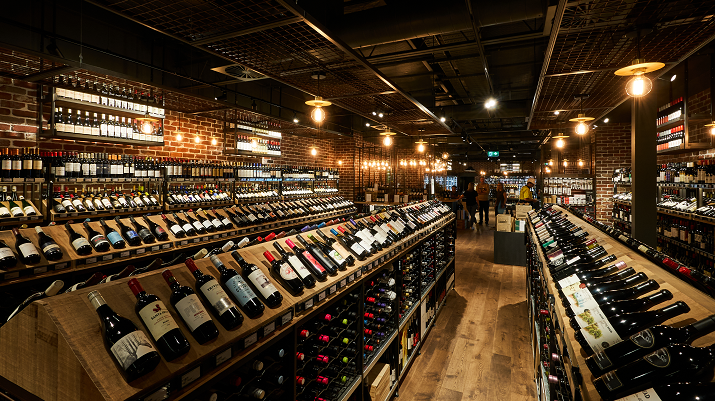It turns out Dan Murphy was a real person and not just a corporate avatar designed to make customers feel they’re buying local when, in fact, they’re getting their alcohol from one of Australia’s largest liquor retailers. Endeavour Group was previously part of Woolworths and subsequently spun off and listed (along with BWS, and hotel and gambling assets) on the Australian Securities Exchange in 2021. Murphy opened his first bottle shop in 1952 in Chapel Street, Prahran, Victoria, and
and differentiated the business by offering a guarantee to beat competitors’ prices. He was also a winemaker and journalist who founded the first wine club in Australia.
Although he eventually expanded to five stores in Victoria, his methods were controversial, with claims he achieved his low prices by avoiding sales tax (there is no suggestion Endeavour Group uses this tactic). Murphy sold his business to Woolworths in 1998, and the company has expanded its footprint to 262 stores right across Australia. It also has a significant online presence, claiming 50 per cent of all online Australian liquor sales.
Economic headwinds don’t worry Dan Murphy’s
Dan Murphy’s managing director Agi Pfeiffer-Smith said the retailer hasn’t seen any evidence of customers choosing cheaper drinks, despite the slowing economy and poor outlook for economic activity in 2023.
“We haven’t seen any indication of customers trading down when it comes to the products they shop for with us,” Pfeiffer-Smith said.
Pfeiffer-Smith stepped into the MD job in July 2022, shifting across from a role as Endeavour Group’s chief strategy officer. She started her career with Boston Consulting Group in 1998, and has previously worked with Wesfarmers and David Jones.
The company makes a big play on its lowest liquor price guarantee and reviews prices every day to stay competitive, using automatically updated electronic price tags with an estimated 10-year battery life.
Pfeiffer-Smith said this concept was designed to “break the compromise between value and discovery for [our] customers…because everyone deserves to drink better, even in more difficult economic times”.
“We feel confident that [this] year we can help customers find drinks they love, no matter what their budget is,” Pfeiffer-Smith said, adding Dan Murphy’s extensive portfolio means there’s a product for every budget and every occasion.
Growth in 2023
Omnichannel is a big focus for this year, along with the My Dan’s membership program, digital offerings and a drinks focused publication, Dan’s Daily.
But it’s omnichannel getting the bulk of the company’s attention. Dan Murphy’s is investing in both the online and offline consumer experience. “Digital channels have become the new front door to Dan Murphy’s,” Pfeiffer-Smith said. “This means for the majority of our customers, the first interaction they have with us is through our app or website.”
Customers are going online to research products before heading in-store to buy, or they are going totally online, getting their alcohol delivered to their front door.
“In the future, we believe customers will still want to visit physical stores, but they will do so for experiences and to engage with others, rather than just picking up a bottle. [This is why] we are focusing on format innovation to meet the changing needs of customers.”
Low- and no-alcohol, premium products
A Brewers Association of Australia budget submission states that the beer industry is in decline. Beer consumption has fallen almost 15 per cent in the last decade. The submission also notes Australia has the fourth-highest beer tax in the industrialised world.
Pfeiffer-Smith did not directly address the decline in beer sales and its effect on Dan Murphy’s; however, she did note there is a great opportunity for all drinks categories, including beer, to innovate to meet changing customer needs.
Dan Murphy’s has also observed a trend towards customers wanting to try new products, with 40 per cent of Endeavour’s retail sales coming from categories that did not exist eight years ago.
One of the innovations she pointed to is the introduction of fruity beer, which is characterised by low bitterness and a sweet, dominant fruit flavour that is stronger on the palate than most craft beers.
“[This] overcomes the flavour barrier, that beer is perceived as bitter by some consumers, [and it] allows us to engage with a whole new customer base.”
The 2021 IWSR Drinks Market Analysis No- and Low-Alcohol Strategic Study states that the volume of these categories in Australia increased by 2.9 per cent in 2020. Overall, the no- and low-alcohol market outperformed regular alcohol, which registered a volume decline of 1.4 per cent over the year.
Dan Murphy’s has also noticed this trend, with Pfeiffer-Smith saying Australians are generally committed to “drinking better”, be it at the premium end of the market or in the low- and no-alcohol segment.
“We offer Australia’s biggest range of no-alcohol options,” she said. “We also saw our biggest ever week for zero-alcohol drinks during Cyber Week, which goes to show this category is growing in popularity.”
Giving back, sustainability, and local sourcing
Pfeiffer-Smith said Dan Murphy’s is focused on working with local suppliers, meaning the shelf mix differs depending on where the store is located. A store in one area might stock products from local brewers or distillers, which might not be available at another store in a different location.
Tasmania exemplifies this – local winemakers and distillers there are represented on Dan Murphy’s shelves.
Dan Murphy’s has also partnered with GIVIT, raising $1.2 million for people in need in conjunction with its customers. “We are passionate about leaving a positive imprint in all the communities we are part of,” Pfeiffer-Smith said.
Sustainability also hasn’t been forgotten, with 20 per cent of all stores having solar panels and more panel roll outs planned this year.
This article was originally published in the 2023 Australian Retail Outlook, powered by KPMG. Download here.







